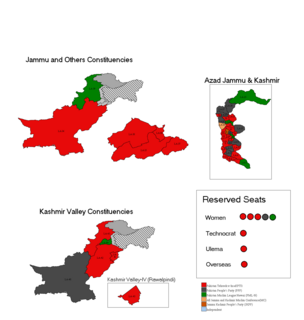Related Research Articles

Azad Jammu and Kashmir, abbreviated as AJK and colloquially referred to as simply Azad Kashmir, is a region administered by Pakistan as a nominally self-governing entity and constituting the western portion of the larger Kashmir region, which has been the subject of a dispute between India and Pakistan since 1947. The territory shares a border to the north with Gilgit-Baltistan, together with which it is referred to by the United Nations and other international organizations as "Pakistani-administered Kashmir". Azad Kashmir also shares borders with the Pakistani provinces of Punjab and Khyber Pakhtunkhwa to the south and west, respectively. On its eastern side, Azad Kashmir is separated from the Indian union territory of Jammu and Kashmir by the Line of Control (LoC), which serves as the de facto border between the Indian- and Pakistani-controlled parts of Kashmir. Geographically, the administrative territory of Azad Jammu and Kashmir covers a total area of 13,297 km2 (5,134 sq mi) and has a total population of 4,045,366 as per the 2017 national census.

Ghulam Nabi Azad is an Indian politician who served as Leader of Opposition in Rajya Sabha between 2014 to 2021. He also served as the Chief Minister of erstwhile state of Jammu and Kashmir from 2005 to 2008. On 26 September 2022, Azad announced his own political party as Democratic Azad Party. He is the chief patron cum founder of Democratic Azad Party.

Sardar Muhammad Ibrahim Khan was the key instigator of the 1947 Poonch Rebellion in the princely state of Jammu and Kashmir in British India and the later establishment of Azad Kashmir under Pakistani administrative control. He served as the first President of Azad Kashmir. His dismissal in 1950 led to the 1955 Poonch Uprising against Pakistan. He served as the president thrice afterwards, ending his last term in 2001.
Sultan Mehmood Chaudhry is a politician who hails from Azad Kashmir. He served as Prime Minister of Azad Kashmir between July 1996 to July 2001 and is currently serving as the President of Azad Kashmir since 25 August 2021.

The Pakistan-administered state of Azad Kashmir was officially established on 24 October 1947. The president is the constitutional head while the prime minister is the chief executive of the state. The president elected by the Azad Jammu and Kashmir Legislative Assembly for term of 5 years under the provisions of Azad Jammu & Kashmir Act, 1974.

Prime Minister of Azad Kashmir is the chief executive of Azad Kashmir region of Pakistan. The title of Prime Minister symbolizes the nominal independence of Azad Kashmir. The prime minister heads the Council of Ministers, who are members of the Azad Kashmir Legislative Assembly, the PM too is elected by the AJK Legislative Assembly which is directly elected by the people.

The Legislative Assembly of Azad Jammu and Kashmir, also known as AJK Legislative Assembly, is a unicameral legislature of elected representatives of the Pakistani administered state of Azad Kashmir, which is located in Muzaffarabad, the capital of the state. It was established under the Interim Constitution of AJK having a total of 53 seats, with 41 general seats, while 8 are reserved of which 5 are for women, 1 for Ulama, 1 for Technocrats and 1 for J&K nationals residing abroad.

The Government of Azad Kashmir is the state government which administers one of the territories of Pakistani-administered Kashmir territories of Azad Kashmir. The Azad Kashmir government consists of a president as head of state and a prime minister as chief executive, with the support of a council of ministers. The state assembly is the Azad Kashmir Legislative Assembly.
General elections were held in Azad Kashmir on 26 June 2011 to elect the members of ninth assembly of Azad Kashmir.
General elections were held in Azad Kashmir on 11 July 2006 to elect the members of eighth assembly of Azad Kashmir. Sardar Attique Ahmed Khan and Raja Zulqarnain Khan were respectively elected as Prime Minister and President of Azad Kashmir. The All Jammu and Kashmir Muslim Conference won 31 out of 49 seats.
General elections were held in Azad Kashmir on 5 July 2001 to elect the members of seventh assembly of Azad Kashmir.
General elections were held in Azad Kashmir in 1996 to elect the members of sixth assembly of Azad Kashmir.
General elections were held in Azad Kashmir in 1991 to elect the members of fifth assembly of Azad Kashmir.
General elections were held in Azad Kashmir in 1990 to elect the members of fourth assembly of Azad Kashmir.
General elections were held in Azad Kashmir in 1975 to elect the members of second assembly of Azad Kashmir.
General elections were held in Azad Kashmir in 1970 to elect the members of first assembly of Azad Kashmir.

General Elections were held in Azad Kashmir on 25 July 2021 after the expiry of the 5-year term of the previous Legislative Assembly. The 2021 General Elections of Azad Jammu and Kashmir held on 25 July, the region's election commission announced on Thursday. The elections were held in 33 constituencies of Azad Kashmir and 12 constituencies of the refugees of Jammu and Kashmir.
Elections in Azad Jammu and Kashmir, a region administered by Pakistan are held according to the Interim Constitution of Azad Jammu and Kashmir provides for an apparently transitory autonomous parliamentary framework of self-governance and power sharing for the region of Azad Jammu and Kashmir, defined by the act as the "territories of the State of Jammu and Kashmir which have been liberated by the people of that State and for the time being under the administration of Government and such other territories as may hereafter come under its administration", however it does not pertain to areas such as Gilgit, Hunza and Baltistan. The act succeeded and re-enacted the Azad Jammu and Kashmir Government Act, 1970 with modifications. It is based on the 1973 Constitution of Pakistan.
References
- ↑ "Azad Jammu & Kashmir Legislative Assembly". Archived from the original on 2017-12-30. Retrieved 2017-12-23.